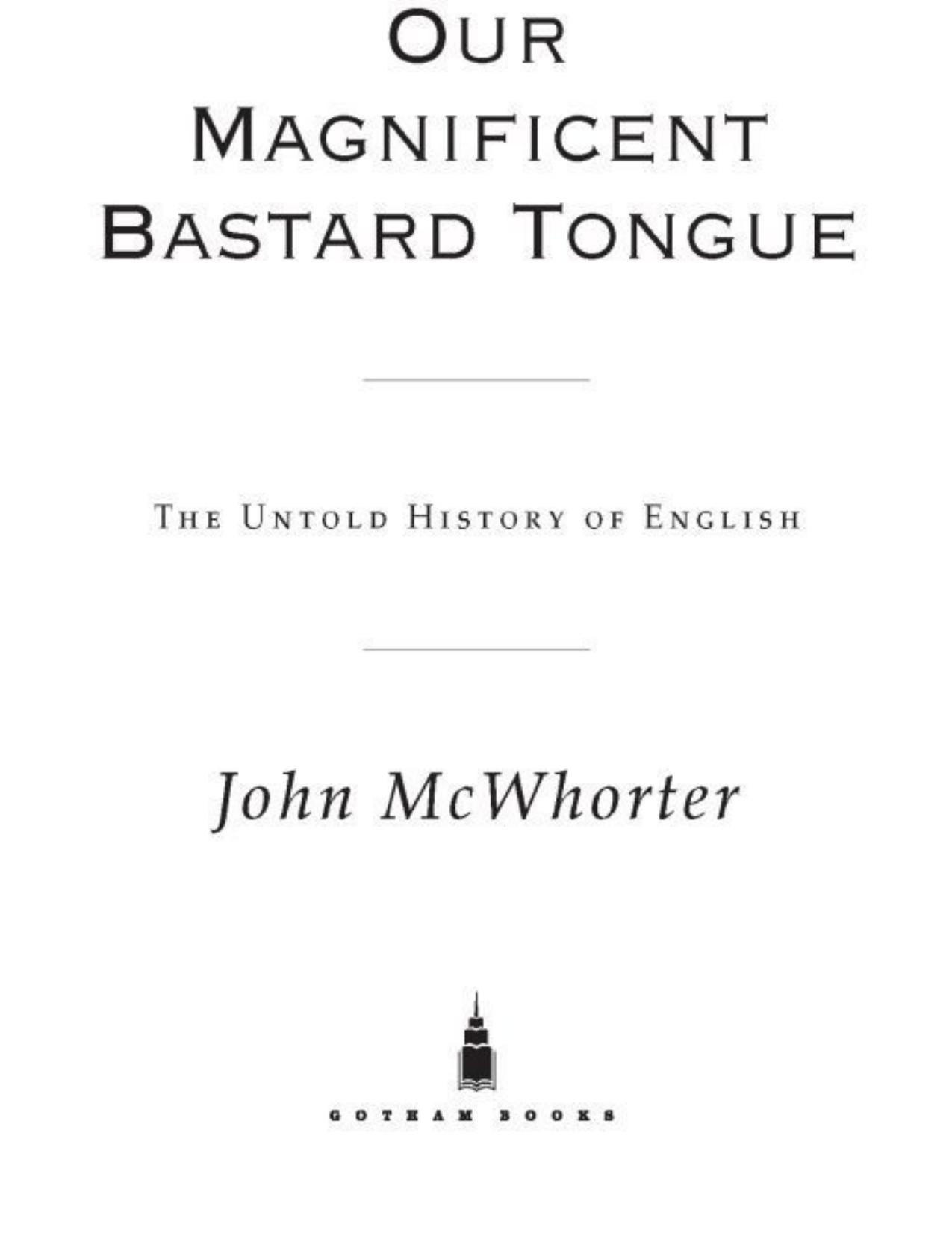Our Magnificent Bastard Tongue: The Untold Story of English by John McWhorter

Author:John McWhorter
Language: eng
Format: mobi, epub, pdf
Tags: Science, History, Sociology, Non-fiction
ISBN: 9781592403950
Publisher: Gotham
Published: 2008-10-30T10:00:00+00:00
And somme understonde wel Englysch
that can nother Latyn nor Frankys.
Bothe lered and lewed, olde and gonge,
Alle understonden english tonge.
Lewed, by the way, meant “unlearned”—neat how the word has evolved into its modern Hustler connotation. And gonge, by the way, was young.
We can assume, then, that the Norman impact on English was in terms of words, and lots of them. That’s old news. Who beat up English’s grammar?
The Viking Impact
Here is where our Vikings come in. Grown men raised on Old Norse were suddenly faced with having to do their raggedy best speaking Englisc on a regular basis whenever they spoke with anyone besides the guys they came over with. The simple fact is that adults have a harder time learning languages than children and teenagers—and this was an era when there was no Berlitz, no language instruction beyond someone on the fly telling you, “Here’s the word for . . . ,” and for the most part, not even any writing.
They came in one wave after another over a century—for generations there were ever new hordes of men from across the sea not speaking the language right. Crucially, whereas French came to England as an elite language spoken by rulers living remotely from the common folk, the Vikings took root on the ground, often marrying English-speaking women, such that their children actually heard quite a bit of their “off” English. All of this had an effect on the English language.
The waves in question started in 787, Danes on the eastern side and Norwegians round the western one. For the next hundred years England coped with increasing numbers of these invaders, culminating in an agreement in 886 that the Vikings would confine their dominion to the northern and eastern half of England, thence termed the Danelaw.
The power that the Vikings wielded is clear in traditionally noted things such as the proliferation of Scandinavian-derived place names in the Danelaw area ending in -by and -thorp, and names ending in -son (like Orm Gamalson, he of the sundial), as well as transformations of bureaucratic procedure. These things alone, however, cannot, in the strict sense, tell us much about whether these people were passing their rendition of English down to new generations of people of both Scandinavian and Anglo-Saxon (and Celtic) descent. Power can be wielded by almost counterintuitively small numbers of people, and thus have no effect on how everyday language is spoken.
For example, China was ruled by foreigners for much of its history, including the famous Mongolian regime of Genghis Khan, as well as Manchus from 1644 to as recently as 1911. However, the languages of the rulers had no effect on Chinese. The foreigners ruled from their compounds, using interpreters to communicate with the outside. Actual Chinese people largely encountered the foreigners in occasional interactions with soldiers—if at all. Chinese as spoken by millions across a vast land was unaffected.7 In Africa, colonial languages, like English, French, and Portuguese, have certainly poured words into small local languages—but they have had almost no effect on these languages’ grammars.
Download
Our Magnificent Bastard Tongue: The Untold Story of English by John McWhorter.epub
Our Magnificent Bastard Tongue: The Untold Story of English by John McWhorter.pdf
This site does not store any files on its server. We only index and link to content provided by other sites. Please contact the content providers to delete copyright contents if any and email us, we'll remove relevant links or contents immediately.
Cecilia; Or, Memoirs of an Heiress — Volume 1 by Fanny Burney(32558)
Cecilia; Or, Memoirs of an Heiress — Volume 2 by Fanny Burney(31956)
Cecilia; Or, Memoirs of an Heiress — Volume 3 by Fanny Burney(31941)
The Lost Art of Listening by Michael P. Nichols(7506)
Asking the Right Questions: A Guide to Critical Thinking by M. Neil Browne & Stuart M. Keeley(5775)
We Need to Talk by Celeste Headlee(5615)
On Writing A Memoir of the Craft by Stephen King(4943)
Dialogue by Robert McKee(4403)
Pre-Suasion: A Revolutionary Way to Influence and Persuade by Robert Cialdini(4232)
I Have Something to Say: Mastering the Art of Public Speaking in an Age of Disconnection by John Bowe(3887)
Elements of Style 2017 by Richard De A'Morelli(3349)
The Book of Human Emotions by Tiffany Watt Smith(3309)
Fluent Forever: How to Learn Any Language Fast and Never Forget It by Gabriel Wyner(3083)
Name Book, The: Over 10,000 Names--Their Meanings, Origins, and Spiritual Significance by Astoria Dorothy(2987)
Why I Write by George Orwell(2953)
Good Humor, Bad Taste: A Sociology of the Joke by Kuipers Giselinde(2950)
The Art Of Deception by Kevin Mitnick(2804)
The Grammaring Guide to English Grammar with Exercises by Péter Simon(2744)
Ancient Worlds by Michael Scott(2688)
